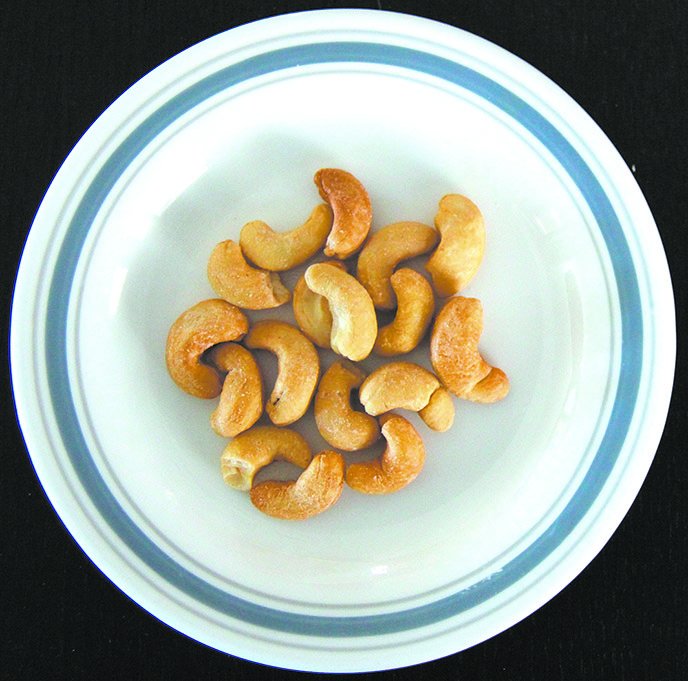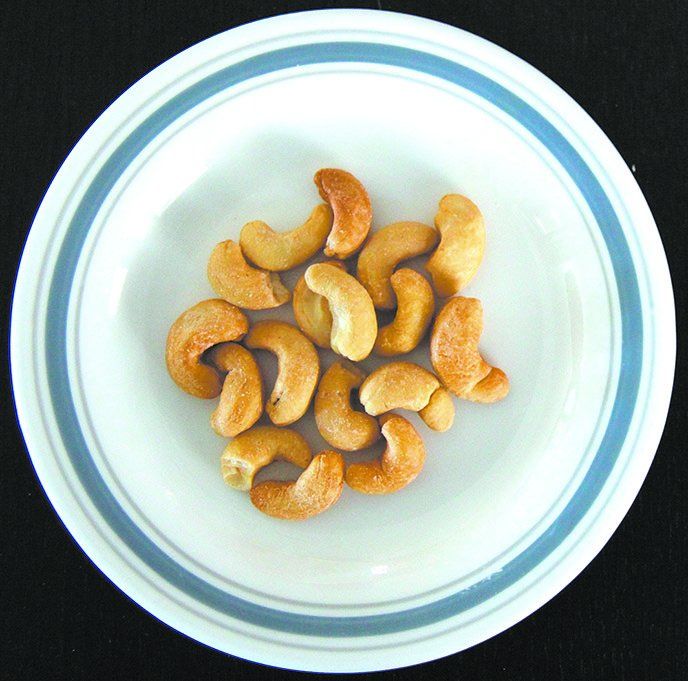Image ©ThinkStock

For the first time, a combined analysis of data from studies totaling more than 350,000 participants has concluded that a daily handful of nuts not only delivers healthy nutrition—it might also help you live longer. Although the 15 studies were not designed to prove cause and effect, the new meta-analysis reported an association between regular nut consumption and reduced mortality risk. The link was strongest for cardiovascular mortality—in line with research showing heart benefits from eating nuts—but was also seen for deaths from cancer and all causes.
“Nuts are tiny nutritional powerhouses, which taste as good as they are good for you,” says Jeffrey Blumberg, PhD, director of Tufts’ HNRCA Antioxidants Research Laboratory.
HEART SMARTS: Previous studies, including randomized trials, have demonstrated cardiovascular benefits from eating nuts (see the June newsletter), especially improvements in cholesterol levels and blood-vessel function. Nuts also have antioxidant and anti-inflammatory effects, and have been found to improve insulin resistance.
As Blumberg and colleagues noted in a review published in the Journal of Nutrition, “Nuts are an excellent source of vitamin E and magnesium [nutrients many Americans don’t get enough of]. Individuals consuming nuts also have higher intakes of folate, beta-carotene, vitamin K, lutein plus zeaxanthin, phosphorus, copper, selenium, potassium and zinc per 1,000 calories.”
Nuts are rich in unsaturated fats, but their blood-cholesterol benefits exceed what would be expected from heart-healthy fats alone. Nuts’ phytosterols, dietary fiber and flavonoids likely also contribute to cardiovascular health.
LONGEVITY LINKS: Not surprisingly, the new meta-analysis, published in the American Journal of Clinical Nutrition, found the clearest association between nuts and lower mortality risk when looking at deaths from cardiovascular causes. A daily serving of nuts—about an ounce, or a medium handful—was associated with a 39% lower risk of cardiovascular mortality. People who ate even a weekly serving of nuts were still at 7% lower risk.
The international team of researchers, led by Giuseppe Grosso, MD, of the University of Catania in Italy, also found a 27% lower risk of all-cause mortality associated with daily nut consumption and 4% lower risk with weekly intake. Overall, as nut consumption went up, the risk of dying from any cause during the study periods declined. When the highest group of nut consumers was compared with those eating the least, nut consumption was also associated with decreased risk of death from cancer.
Dr. Grosso and colleagues cautioned that study participants who ate more nuts also were more likely to have an overall healthier diet and a lower BMI and less prone to smoke. “Nut consumption,” they wrote, “may reflect overall healthier lifestyle choices that eventually lead to decreased mortality risk.”
Image ©ThinkStock

SUBSTITUTION SAVVY: In any case, nuts are a nutrient-rich food that—barring allergies—you should consider making a regular part of your diet. They are also a concentrated source of calories, with about 160 to 200 calories per ounce. But studies have suggested that not all those calories may be absorbed by the body. In fact, a 2011 Harvard study actually found an inverse relationship between eating nuts and weight gain; nuts ranked second only to yogurt as a food linked to losing weight.
Instead of adding extra food, however, it’s always better to substitute a healthy choice like nuts for less-healthy options such as chips and cookies. Tufts’ Blumberg notes, “Nuts are part of the USDA MyPlate portion of protein, so you can also think about substituting them for a serving or less of red meat.”
Choose whatever variety of nuts you like best, Blumberg advises, as the nutrient profiles of nuts are more similar than different, “although the phytochemical profiles can be quite different.” Your choices can also include peanuts, which are legumes and not true tree nuts.
Its easy to incorporate nuts into your daily diet, both as a substitute for less-healthy snacks or as an ingredient in other dishes:
– Combine nuts with herbs such as basil or parsley to make pesto.
– Top salads with nuts instead of croutons or cheese.
– Add nuts to steamed vegetables or stir-fry entrées.
– Use nuts to add crunch to whole-grain dishes.
– Thicken sauces with ground nuts.
– Sprinkle nuts on yogurt.
– Include nuts in homemade granola.
Be aware that nuts high unsaturated fat content makes them prone to spoiling. Keep nuts in an airtight container in your refrigerator or a sealed plastic bag in your freezer; dont store near foods whose odors might be absorbed by the nuts.
– Almonds top all tree nuts per ounce in protein, fiber, calcium, vitamin E, niacin and riboflavin.
– Brazil nuts are among the richest dietary sources of selenium, and are also high in magnesium.
– Cashews are the tree nuts highest in iron, copper and zinc.
– Hazelnuts, also called filberts, are good sources of vitamin E, manganese and copper.
– Macadamia nuts contain the most calories and fat of all nuts, but most of the fat is monounsaturated, as in olive oil.
– Pecans are packed with antioxidants and vitamin E.
– Peanuts, although botanically a legume, are nutritionally similar to tree nuts, high in fiber, vitamin E, magnesium, folate and niacin.
– Pine nuts, also known as piñon, pinoli or pignoli, are second only to walnuts in polyunsaturated fat content and high in manganese.
– Pistachios, the only tree nut that can be roasted in its shell, have the most potassium and vitamin B6.
– Walnuts are the only nut with significant amounts of alpha-linolenic acid (ALA), the plant form of omega-3 fatty acids.























